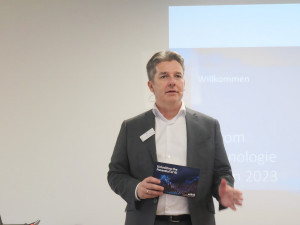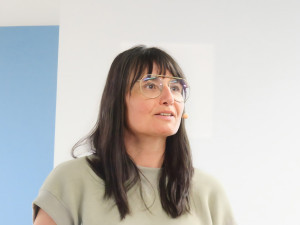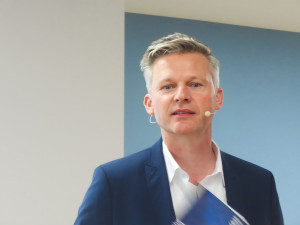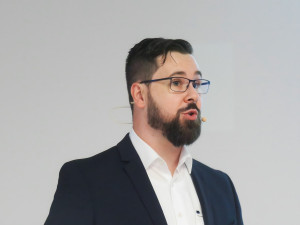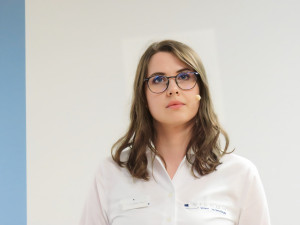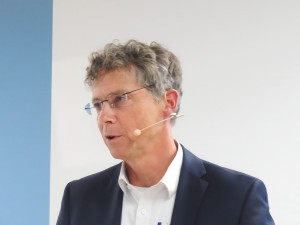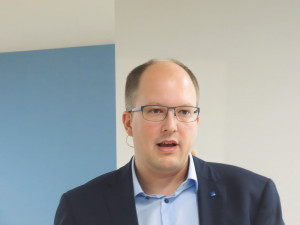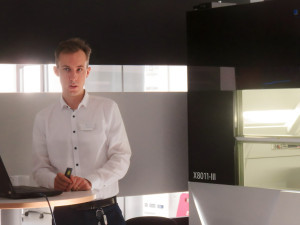Information on industry trends and new technological developments as well as the exchange of ideas between experts were key components of the Technology Forum 2023 organized by Viscom on its campus in Hanover under the motto 'Unlocking the Potential of AI - Smart Connectivity, Decision Making and Inspection Systems'.
The main topic of the Technology Forum was the use of artificial intelligence (AI) in smart machines, which, like the event as a whole, was met with great interest. In addition to the workshops and presentations, the program included a look far beyond the horizon of inspection technologies in electronics production. There was also a system exhibition, individual innovation tours, a company tour that offered insights into production and logistics, and a get-together.
In his welcoming address, CEO Carsten Salewski recounted anecdotes from the company's beginnings to its current international positioning with several subsidiaries and a global sales organization. He emphasized: "We're staying young, we're carrying on like this, we're innovative and we still have big plans." Later, before the first keynote speech, he added that all technologies must be used to improve and that, in addition to AI and technology, the user interface is a key factor for the future of inspection.
The lecture session on the first day started with a keynote on connectivity
Dr. Sabine Seymour, known as a data economist, entrepreneur, researcher, professor and investor in the international tech scene, appealed to the audience in her keynote: 'Get connected: Shaping synergies with new technologies - socially, economically and ecologically'. As she put it, the human body is a node in a networked system with the "circuit board in the brain", and textile electronics technology is the basis for empowerment through sensors and information technology. Using examples of high-tech applications in areas such as fashion, agriculture and health - chronically ill people can be helped with implants - she highlighted the benefits and also drew attention to the risks and possible undesirable developments. Dr. Seymour named seven principles for the implementation of privacy by design. When it comes to the value of data, she emphasized that quality comes before quantity in AI, because sustainability is required. Wisdom, knowledge and information/data are the basis. Europe needs its own infrastructure and supporting laws for this, such as the right to repair. She concluded her keynote with eight ethical questions regarding AI (fairness, responsibility, safety, impact on human interactions and employment, decision-making power and robot rights).
Manuel Salgueiro, Viscom, explained how the best machine performance for repeatable inspection results can be realized, based on the adversities and requirements of inspection technology. Maintenance and servicing of the software and hardware of the inspection systems as well as systematic optimization of the inspection plans are a prerequisite. In addition, vVision 3.40 includes continuous system monitoring in automatic mode after every 50 PCBs, whereby gray values and contrasts are checked as well as a 3D height check and a check of the XM sensor module in order to achieve 100% reliability.
Florian Martin, Viscom, provided information about vSPC 2.0 - the new statistics software based on vConnect, after a review of the software development. vSPC 2.0 now enables cross-site integration of statistical process control, one of the advantages of integration in vConnect. He said: "There are locations that work decentrally but want to be combined and linked. The aim is to evaluate and analyze more and more information in the shortest possible time. A new level of transparency is being achieved in compliance with the highest security criteria. High performance and very good usability are crucial for the queries and results.
Dr. Maren Awiszus, Viscom, demonstrated that artificial intelligence is on the rise, based on its definition and history. She also addressed the problems associated with data protection and security as well as compliance with legal requirements and documentation. The classic tasks of AI include learning from data, but more than just deep learning. This is because generative AI is now available, which opens up far more possibilities. The task now is to develop and use this AI for applications in a responsible and collaborative manner.
Peter Krippner described how 100% quality control can be achieved for power modules and IGBT applications, starting with the particular challenges of 3D X-ray inspection of these objects. Compliance with safety and performance requirements is essential. The '3D-AXI-System iX7059 Module Inspection' is designed to meet these special requirements. The fully automatic 3D X-ray system with integrated computer tomography scores points with easy-to-classify, precise layer inspection images and a large inspection scope. For special tasks such as the inspection of IGBT modules, a 180 kV X-ray tube is available as a component, which allows the various layers of the test object to be analyzed with maximum precision and measured using CT. The possibilities were illustrated using the example of the metrological analysis of voids on IGBT modules.
The presentations on the second day ended with a lecture on space production processes
During the welcome address on the second day, Carsten Salewski addressed the topic of sustainability, quoting Viscom's motto: "We make technology safe, reliable and sustainable." This means: safe end products through testing with reliable function and long service life as well as upgrading and repair options, clean energy production (with the aim of climate neutrality), packaging with paper instead of air cushioning, long-term employees and 22 trainees, and other points such as an in-house crèche. Viscom also fulfills its compliance obligation and has published a corresponding sustainability report for 2022.
Florian Martin then explained how processes can be smartly digitalized with vConnect. He discussed the latest features of the digital multi-purpose platform 'vConnect'. It allows workflows to be smartly digitized and centrally controlled via tablets, smartphones and other devices. From effective and competent IT service for Viscom inspection systems and associated peripheral hardware to fully automated predictive maintenance, training services and future-oriented cloud solutions, there are many possible applications.
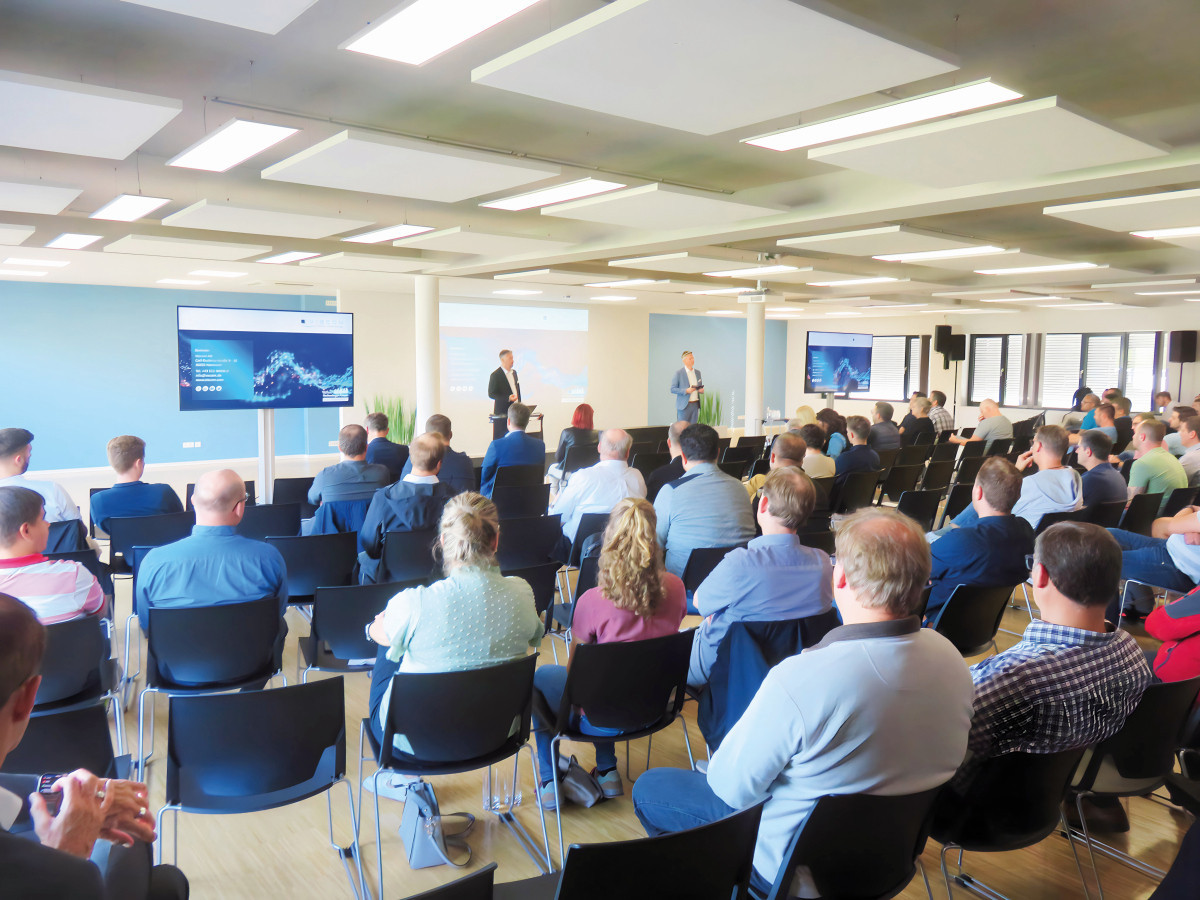 Florian Martin and part of the auditorium
Florian Martin and part of the auditorium
After Dr. Christoph Lotz, Institute of Transport and Automation Technology at Leibniz Universität Hannover, had introduced his institute and provided general information about space research, he spoke about research into production processes under space conditions. For the colonization of space, it is necessary to be able to produce on site.
The weightlessness required for the investigations is achieved with the Einstein Elevator located in Hanover. This state-of-the-art development of a classic drop tower has a total height of 40 m and can simulate weightlessness for 4 seconds. The fields of research range from the investigation of production under space conditions - including experiments for substrate-free additive manufacturing - to basic physical research such as the detection and measurement of dark energy.
Workshop on the autonomous detection of components and soldered joints
Detlef Beer, Head of Product Development at Viscom, presented in a workshop using the vVision operating software how the autonomous detection of components and soldered joints takes place when creating a new inspection program. He went into the training of the AI models used, showed the available options and explained why this approach is particularly advantageous for small batch sizes and prototypes. Detlef Beer emphasized that AI in no way replaces traditional technologies. Rather, it is an additional method that offers great added value as a supplementary input provider.
The following workshops, some of which took place in parallel, were also available to attend:
- Advantages of AI-supported image processing by Benedict Eicke
- Using deep learning for verification by Julien Jahn
- How to successfully switch from SI to vVision by Nils Steding
- Fast AOI/AXI program creation based on ECAD data in practice by Claas Schwabe
- The new generation X8011-III: Focusing on errors with vVision and AI by Dennis Fukas
- The new system - wire bond inspection with vVision by Wolf Rüdiger Pennuttis
Eight innovation tours, which stopped at the inspection systems on display to experience Viscom's inspection technologies live in groups, concluded the two-day event.
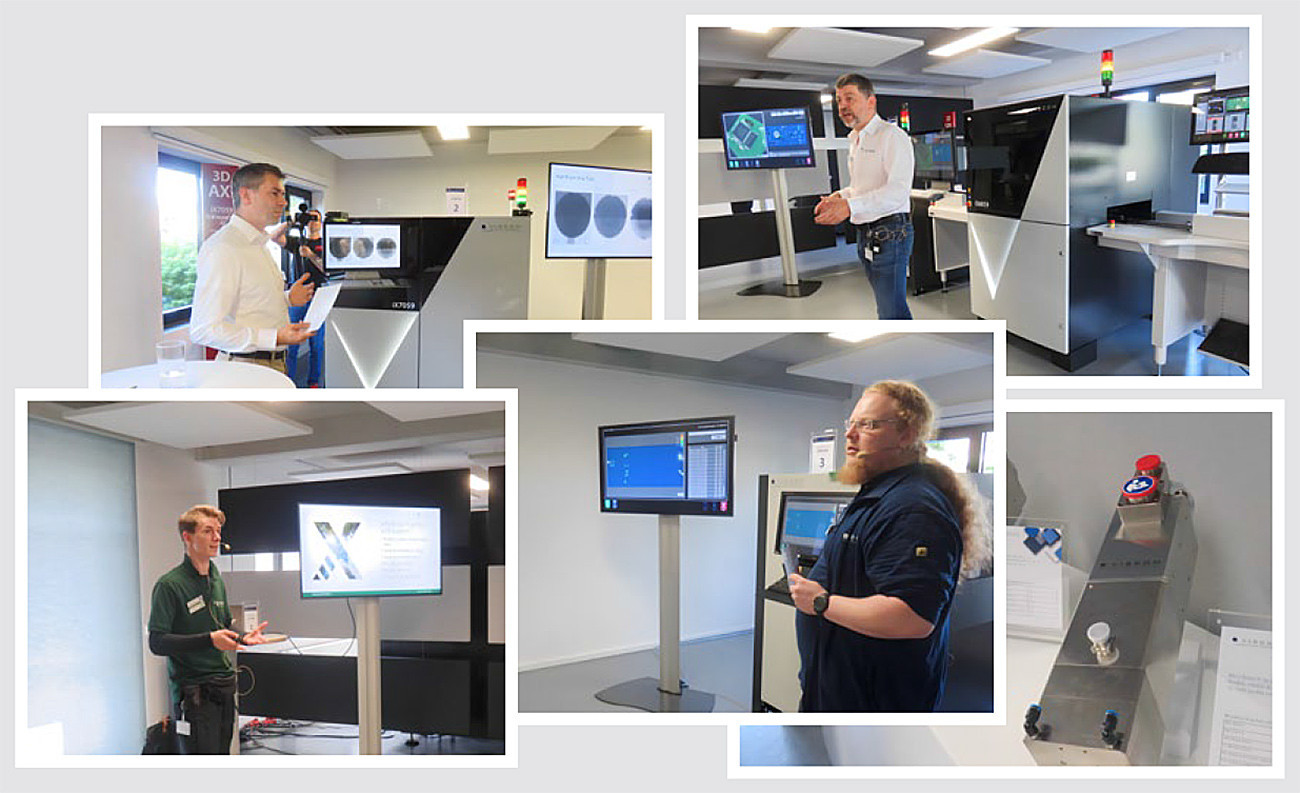 Impressions of the system exhibition and the innovation tours
Impressions of the system exhibition and the innovation tours
Pictures
All photos: Gustl Keller


